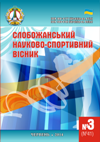Description of the nature of physical culture of a personality of specialist of physical training and sport
DOI:
https://doi.org/10.15391/snsv.2014-3.010Keywords:
physical culture, personality, competence, specialist, physical training, sport, professional maturityAbstract
Purpose: prove the nature of physical culture of a personality of specialist of physical training and sport. Material and Methods: The bases for this article are materials of special literature, in which there was developed some aspects of the theory of physical culture. Results: it was shown that physical culture of a personality of specialist is a component of its general and professional culture and professional competence; it is the basis of social-professional maturity which is acquired in the process of professional training and activity. Conclusions: physical culture of a personality is a complex integrated formation in the structure of specialist’s personality, unites professional and personality aspects and also stipulates formation of physical, sport and life position of specialist of physical training and sport.
References
Vilenskiy M. Ya. Kachestvo obrazovaniya po fizicheskoy culture v vysshey shkole v innovazionnykh proyavleniyakh [The quality of physical education in higher school in innovative display], Moscow, 2008, pp. 62–78. (rus)
Vizitey N. N. Sotsiologiya sporta. Kurs lektsiy [Sociology of sport. Lecture courses], Kyiv, 2005, 247 p. (rus)
Zeyer E. F. Psikhologiya professionalnogo obrazovaniya [Psychology of professional education], Yekaterinburg, 2000, 386 p. (rus)
Zyazyun I. A. Professionalnoye rasvitiye lichnosti v kontekste kulturnykh tsennostey [Professional development of a personality in the context of cultural values], Kyiv, 1998, 236 p. (ukr)
Ivanii I. V. Formuvannia fizychnoyi kultury osobystosti – systemne zavdannia fizychnoho vykhovannia shkolariv [Formation of personality’s physical culture – systemic task of pupils physical culture], Kharkiv, 2010, vol. 4, pp. 128–133. (ukr)
Kuramshyn Yu. F. Ob obyekte i predmete teorii fizicheskoy kultury kak nauchno-uchebnoy distsipliny [About object and subject of theory of physical culture as scientific-educational discipline], 2006, vol. 22, pp. 20–31. (rus)
Lozova V. I. Formuvannia pedahohoichnoyi kompetentnosti vykladachiv vyscchykh navchalnikh zakladiv [Firmation of pedagogical competence of institutes of higher education], Kharkiv, 2002, pp. 3–8. (ukr)
Lubysheva L. I. Vvedeniye v sotsiologyu fizicheskoy kultury i sporta [Introdaction in sociology of physical culture and sport], 2000, 121 p. (rus)
Manzhelei I. V. Fizicheskaya kultura: kompetentnostnyy podkhod [Physical culture: competence aproach], 2012, 182 p. (rus)
Matveyev L. P. Integrativnaya tendebziya v sovremennom fizkulturovedenii [Integrative tendency in modern physical teaching], 2003, vol. 5, pp. 5–8. (rus)
Nikolayev Yu. M. Istoriyaimetodologiyanauki o fizicheskoy culture [History and methodology of science about physical culture], 2010, 200 p. (rus)
Radul V. V. Sotsialno-profesiynazrilist [Social-professional maturity], Kirovograd, 2002, 242 p. (ukr)
Downloads
Published
How to Cite
Issue
Section
License
Copyright (c) 2014 Slobozans`kij naukovo-sportivnij visnik [Slobozhanskyi herald of science and sport]

This work is licensed under a Creative Commons Attribution 4.0 International License.
Our publications make use of copyright CREATIVE COMMONS open access journals.
Authors published in this journal agree to the following terms:
1 The authors reserve the right of authorship of the work and pass the journal right of first publication of this work are licensed under the Creative Commons Attribution License, which allows others to freely distribute the published work with reference to the authors of the original work and the first publication of this magazine.
2 The authors have the right to enter into separate agreements for additional non-exclusive distribution of work in the form in which it was published the magazine (such as work place electronic repository institution or publish as part of the monograph), provided that the reference to the first publication of this magazine.

 Attention, authors!
Attention, authors!


